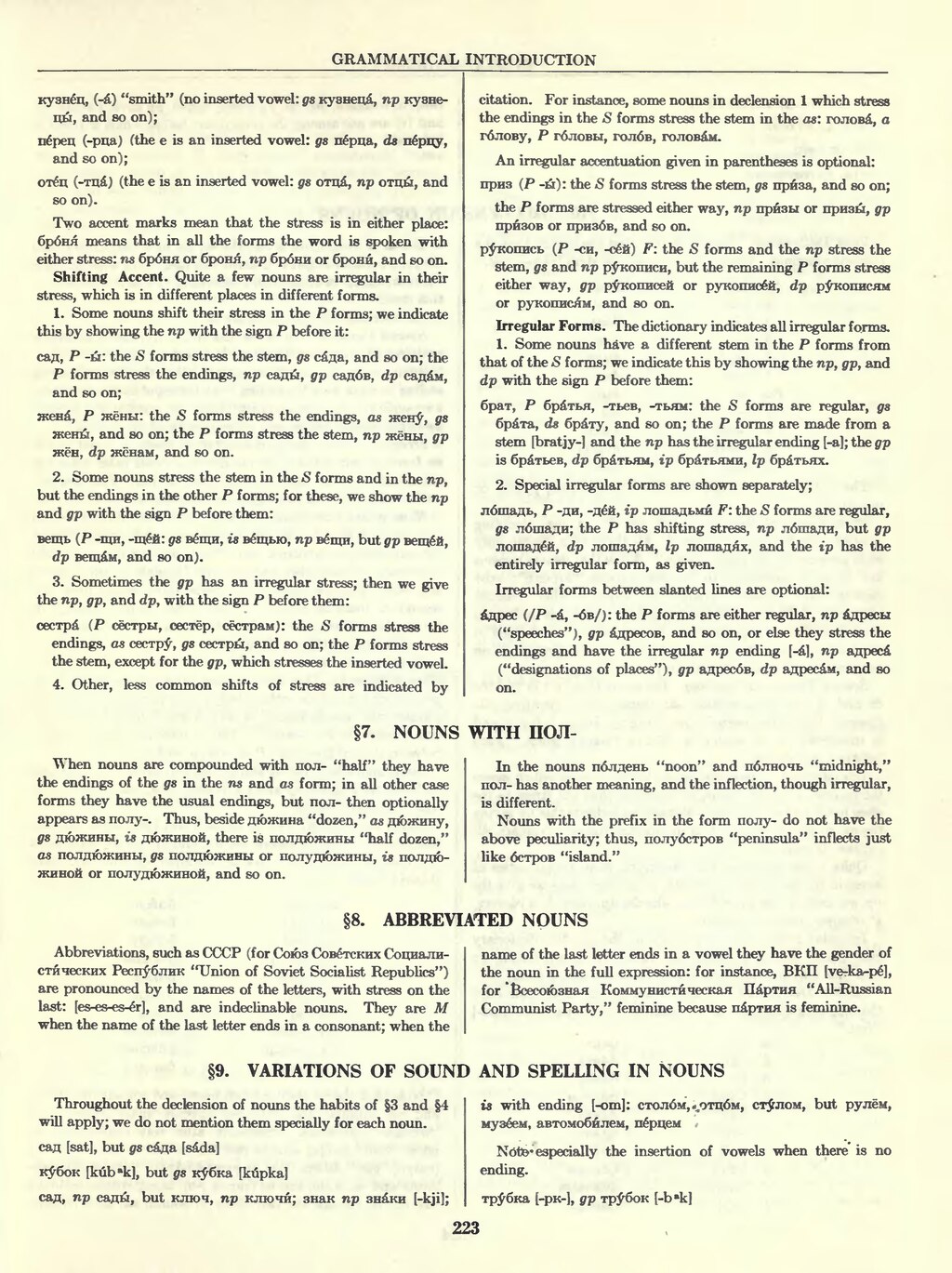кузнец, (-а) "smith" (no inserted vowel: gs кузнеца, np кузнецы,
and so on);
перец (-рца) (the е is an inserted vowel: gs перца, ds перцу,
and so on);
отец (-тца) (the е is an inserted vowel: gs отца, np отцы, and
so on).
Two accent marks mean that the stress is in either place: броня means that in all the forms the word is spoken with either stress: ns броня or броня, np брони or брони, and so on.
Shifting Accent. Quite a few nouns are irregular in their stress, which is in different places in different forms.
1. Some nouns shift their stress in the P forms; we indicate this by showing the np with the sign P before it:
сад, P -ы: the S forms stress the stem, gs сада, and so on; the
P forms stress the endings, np сады, gp садов, dp садам,
and so on;
жена, P жёны: the S forms stress the endings, as жену, gs
жены, and so on; the P forms stress the stem, np жёны, gp
жён, dp жёнам, and so on.
2. Some nouns stress the stem in the S forms and in the np, but the endings in the other P forms; for these, we show the np and gp with the sign P before them:
вещь (P -щи, -щёй: gs вещи, is вещью, np вещи, but gp вещей, dp вещам, and so on).
3. Sometimes the gp has an irregular stress; then we give the np, gp, and dp, with the sign P before them:
сестра (P сёстры, сестёр, сёстрам): the S forms stress the endings, as сестру, gs сестры, and so on; the P forms stress the stem, except for the gp, which stresses the inserted vowel.
4. Other, less common shifts of stress are indicated by citation. For instance, some nouns in declension 1 which stress the endings in the S forms stress the stem in the as: голова, a голову, P головы, голов, головам.
An irregular accentuation given in parentheses is optional:
приз (P -ы): the S forms stress the stem, gs приза, and so on; the P forms are stressed either way, np призы or призы, gp призов or призов, and so on.
рукопись (P -си, -сёй) F: the S forms and the np stress the stem, gs and np рукописи, but the remaining P forms stress either way, gp рукописей or рукописей, dp рукописям or рукописям, and so on.
Irregular Forms. The dictionary indicates all irregular forms.
1. Some nouns have a different stem in the P forms from that of the S forms; we indicate this by showing the np, gp, and dp with the sign P before them:
брат, P братья, -тьев, -тьям: the S forms are regular, gs брата, ds брату, and so on; the P forms are made from a stem [bratjy-] and the np has the irregular ending [-а]; the gp is братьев, dp братьям, ip братьями, lp братьях.
2. Special irregular forms are shown separately;
лошадь, P -ди, -дёй, ip лошадьми F: the S forms are regular, gs лошади; the P has shifting stress, np лошади, but gp лошадей, dp лошадям, lp лошадях, and the ip has the entirely irregular form, as given.
Irregular forms between slanted lines are optional:
адрес (/P -a., -ob/): the P forms are either regular, np адресы ("speeches"), gp адресов, and so on, or else they stress the endings and have the irregular np ending [-а], np адреса ("designations of places"), gp адресов, dp адресам, and so on.
§7. NOUNS WITH ПОЛ-
When nouns are compounded with пол- "half" they have the endings of the gs in the ns and as form; in all other case forms they have the usual endings, but пол- then optionally appears as полу-. Thus beside дюжина "dozen," as дюжину, gs дюжины, is дюжиной, there is полдюжины "half dozen," as полдюжины , gs полдюжины or полудюжины, is полдюжиной or полудюжиной, and so on.
In the nouns полдень "noon" and полночь "midnight," пол- has another meaning, and the inflection, though irregular, is different.
Nouns with the prefix in the form полу- do not have the above peculiarity; thus, полуостров "peninsula" inflects just like остров "island."
§8. ABBREVIATED NOUNS
Abbreviations, such as СССР (for Союз Советских Социалистических Республик "Union of Soviet Socialist Republics") are pronounced by the names of the letters, with stress on the last: [es-es-es-er], and are indeclinable nouns. They are M when the name of the last letter ends in a consonant; when the name of the last letter ends in a vowel they have the gender of the noun in the full expression: for instance, ВКП [ve-ka-pe], for Всесоюзная Коммунистическая Партя "All-Russian Communist Party," feminine because партя is feminine.
§9. VARIATIONS OF SOUND AND SPELLING IN NOUNS
Throughout the declension of nouns the habits of §3 and §4 will apply; we do not mention them specially for each noun.
сад [sat], but gs сада [sada]
кубок [kub'k], but gs кубка [kupka]
сад, np сады, but ключ, np ключи [-kji];
is with ending [-om]: столом, отцом, стулом, but рулём,
музеем, автомобилем, перцем
Note especially the insertion of vowels when there is no ending.
трубка [-pk-], gp трубок [-b'k]
